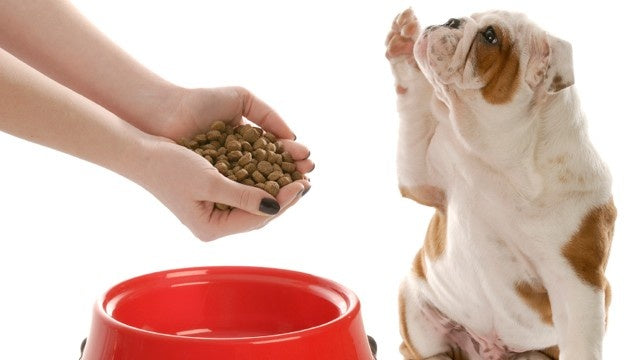Nutritional requirements of a dog generally depend on its size, age, metabolism and level of activities it is involved in. A general rule of thumb says that young dogs need more food which offers them higher levels of protein and fat. This is evident from the fact that puppies and younger dogs are more involved in physical activities. Another general perception says that large breed dogs require less food as compared to small breed dogs per pound of body weight. Read on for the guidelines on how much you should feed to your dog on different sizes of its life:
Puppies: Puppies need a protein rich diet that can help them in growth. Generally puppies are weaned from their mother’s milk by 2 months. If puppies are separated from their mother before eight weeks, they have generally weaker immune system as they don’t get required nutrition from mother’s milk. After two months, puppies are kept on solid diet. If you are feeding commercial food to your puppy, make sure that you are using a brand that is specially formulated for puppies. Also, ensure that your puppies are being fed three times a day till the age of five or six months. Try not giving milk to puppies as it can upset stomach; you can add water to dry food if your dog is resisting eating dry food, or is fussy about feeding demands. Remove the uneaten food from the puppy after an hour. Feeding more than the required food can cause obesity. Consult your vet in case of any confusion regarding the diet of your puppy.
Adults: Dietary requirements of dogs change as they enter into maturity. At the age of one year, an average dog enters a “maintenance period” indicating that the dog will require same food as he consumed in its puppyhood or early adulthood provided he is not training extremely. Again, if you choose to stick with commercial dog food, make sure it is formulated specially for adult dogs.
At adulthood, the weight of a dog will reach stability and he will have a noticeable waist. An adult dog’s desire for food may vary from day to day, so it is not a sign of worry for you if your dog resist too food on a particular day. But if your dog is repetitively rejecting food and is losing weight, it is time to consult your vet.
If your dog is involved in exercise and undergoes an intense level of training, he will require more energy than the dogs who are hardly engaged in physical activities. You should not feed your active adults immediately after workouts because it can lead to digestion problems such as vomiting, gastric bloat, loose stools etc.
Provide your dog with a bowl of fresh drinking water in the morning. The most important consideration while selecting meal plan for your active adult dog is that you have to provide him the right balance of fats & oils, minerals, vitamins and carbohydrates. Offer your dog small meal in the morning and heavy meal after the last exercise session of the day. During periods of increased physical activity, offer him treats and snacks to fulfill calorie requirement.
Seniors: Nutrition requirements of dogs change as they age. Just like humans, senior dogs have less energy requirements and should be provided less food as compared to their young counterparts. Like other dogs, the diet of a senior dog will heavily depend on the breed, size, level of physical activity and metabolism.
The Final Word:
Apart from how much dog should be fed, there are some other factors also which should be kept in mind. Make sure that you are feeding your dog at the same day every day. Also, don’t change the food brand frequently because digestive system of dogs can’t adopt such changes like humans. Keep water and food bowls clean for the good health of the dog.

